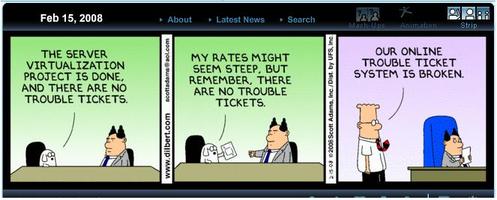I think we all generally prefer to try and generate blog posts ourselves rather than just copying – but read this and thought it was simply too pertinent not to share. Have trimmed it a little, and added some of my own thoughts at the bottom, but you can read the whole thing at Web Strategy by Jeremiah_owyang
A new form of the Groundswell has appeared. What’s the Groundswell? We define it as a movement where individuals get what they need from each other, rather from existing institutions. In this case, employees are starting to collaborate, outside of the corporate firewall to connect, share, and learn from each other, here’s a few examples beyond the traditional Yahoo Finance Chat rooms:
Glassdoor: Rate Employers, CEOs, and find out Industry Salaries
This site launched today, although a few of my colleagues were briefed last week. Essentially, to obtain knowledge about company reviews, CEO reviews, and salary information, you have to first submit your information –all anonymously. This stealth startup, which just launched is being discussed on Techcrunch and on Cnet. I just reviewed my former employer to gain access. Essentially, companies are peer reviewed, and you can find out industry averages to see how well you do or don’t measure up to industry peers.Criticat: Review, Advise and Discuss your employer
This startup, much in the same vein as Glassdoor offers a collaborative view into your company: “Do you feel you have a great solution to a problem in your company but not sure if everyone else will agree with you?”. Essentially, collaboration around company brainstorms happens outside the firewall.Social Networks: LinkedIn, Xing, Facebook etc.
Of course, it goes without mention that many colleagues are assembling on these social networks, before, during, and afterwork. Some frustrated companies block social networks from their firewalls, while the next generation of workers will simply bypass those shallow walls using mobile devices – the Groundswell is difficult to stop. Instead, brands should lead with policy, embrace, and look for the business opportunities of having a connected workforce.
Dangers and Opportunities of the Crowdsourced Company
The previous examples indicate a trend of what’s happening: The conversations that used to take place at the physical watercooler, has now shifted online, organized, and manifests as something greater. But what are the impacts?Sometimes false, sometimes inflammatory, and sometimes truthful, yet frustrated sounding information will be posted to these sites from employees, former employees, and customers.
Employees get more control, as their voice will be heard to other colleagues, and in some cases, to the entire internet. Salaries will be puffed, as professionals will seek to demonstrate how much they are valued, I expect salary data to be inaccurate, and inflated.
Candidates will have more bargaining power during hiring process, as they can view not only third party salary.com, but now look at pan-industry salaries –hiring managers and recruiters will refute.
Employees will seek out the hire paying next step job, and develop career-pathing to lead to the larger pot of gold.Corporations will flinch, and many will setup policies to prevent employees from posting private information outside of the firewall although many of these internal memos will appear within hours on the very sites they seek to stop.
Dissatisfied and passionate employees and customers will assemble on these third party sites to self-support each other, few companies will realize how they need to follow the conversation.
Some savvy brands will get ahead of this Groundswell, and launch their own tools internally and externally, some will successful centralize –then lead –their market conversation.
What other impacts do you see happening from this new pattern of websites that turn power over to employees and customers?
I think that Jeremiah is on the money, as usual, in spotting emerging platforms and trends that are potential landscape changers – and then explaining how. He's just not given it the full consideration that Employer Brand professionals would though – but then that’s not his bag and nor does he profess it is (he’s Product Marketing based so here is straying into “our space”). So whilst he’s focussed on the potential for people using such facilities purely for salary gain, the blunt edge of recruitment and retention, I think those people who get all of this within our space will realise that it’s actually more about e-Employer Brand Management.
Let’s be honest, £5k here or £5k there (pre tax) doesn’t make any much difference (and if you’re a gen pigeon hole subscriber then salary is far less important to GenY than it has been to X or Boomers – although lets see how some economic slow time affects that), however bad recruitment / employee experience (as much as bad customer experience in Jeremiah's experience) has the potential of spreading like wild fire and affecting your potential candidates’ perceptions of working for you. You’ll still generate candidates, sure, but if you're not listening and actively telling your side of the story (as well as ensuring that actually you are a good and / or fair organisation to work for with robust, fair and transparent recruitment processes) then you might just start to find it harder than ever to attract that top talent as word gets out, or at least one strain of your employment truth emerges.
And that’s the point. The digital world broadcasts individual truths – so corporates’ have to get their heads around this and ensure that as well as their employment house being in order (the starting point!) that they are listening, ready and willing to tell me (the potential candidate) their truth.
But remember: that telling of your truth now happens as a conversation - not a statement.

Recent Comments